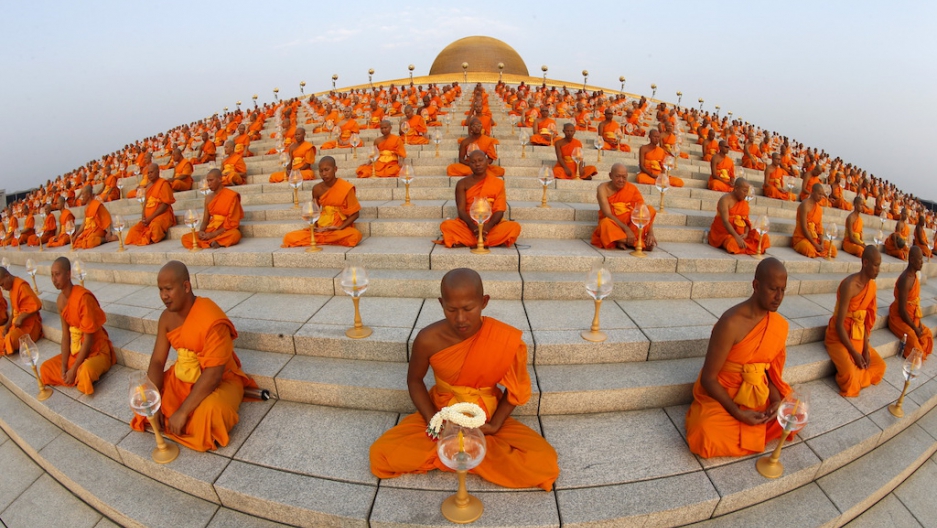Welcome to “Bangkok’s Monks: A Look at the Lives and Practices of Buddhist Monks”! In this blog, we will explore the fascinating world of Buddhist monks in Bangkok, Thailand, and gain a deeper understanding of their lives, beliefs, and practices.
Buddhism is deeply ingrained in Thai culture, and monks play a vital role in the daily lives of the Thai people. They are revered for their wisdom, discipline, and devotion to the teachings of the Buddha. Through this blog, we will gain insight into the daily routine of monks, their beliefs and practices, and their interactions with the local community.
We will delve into the unique aspects of monastic life in Bangkok, such as the selection and training of monks, the role of meditation in their practices, and the importance of ethics and guidelines in maintaining a disciplined lifestyle. We will also examine the challenges and opportunities facing modern-day monks in a rapidly changing society.
Join us as we take a closer look at the world of Bangkok’s monks and gain a deeper appreciation for the rich cultural heritage of Thailand.
Table of Contents
Introduction to Bangkok’s Buddhist Monks
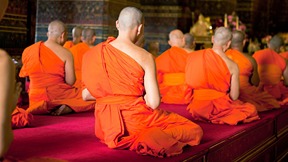
Bangkok, the capital city of Thailand, is known for its vibrant culture, bustling streets, and exquisite temples. At the heart of this city’s cultural identity are its Buddhist monks, who are revered for their spiritual insight, wisdom, and devotion to the teachings of the Buddha.
Buddhism has been a part of Thai culture for over 2,000 years, and its influence can be seen in every aspect of Thai life. Monks play a significant role in the daily lives of the Thai people, providing guidance, support, and spiritual leadership. In fact, nearly 95% of the Thai population identifies as Buddhist.
Becoming a monk in Bangkok is seen as a noble and honorable pursuit, and it is not uncommon for young men to spend a period of time as a monk as part of their spiritual journey. Monks are also deeply involved in community service, helping to care for the sick and needy, as well as providing education and outreach to the local community.
The robes worn by monks in Bangkok are a distinctive saffron color, which signifies their dedication to the teachings of the Buddha. Monks lead a simple and disciplined lifestyle, following a set of rules and guidelines designed to help them live in accordance with the teachings of the Buddha.
In this blog, we will explore the fascinating world of Bangkok’s Buddhist monks, gain insight into their daily routine and practices, and learn more about the unique role they play in Thai society. Whether you are a seasoned traveler or simply curious about other cultures, this blog will provide a unique window into the world of Bangkok’s monks and their way of life.
The Role of Monks in Thai Society
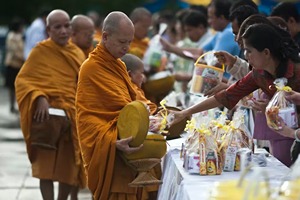
Monks play a significant role in Thai society, providing spiritual guidance, support, and leadership to the people of Thailand. They are seen as living examples of the Buddha’s teachings and are highly respected for their wisdom, compassion, and discipline.
One of the primary roles of monks in Thai society is to serve as spiritual guides to the people. They are often consulted for advice and guidance on a wide range of issues, including personal and family matters, business decisions, and matters of faith. Monks also play an important role in performing religious ceremonies, such as weddings, funerals, and blessings for new homes and businesses.
In addition to their spiritual leadership, monks are also deeply involved in community service. They are known for their acts of kindness and compassion, often working to care for the sick and needy in their local communities. Many temples in Bangkok also provide education and outreach programs to help improve the lives of those in need.
Monks are also seen as protectors of Thai culture and heritage. They help to preserve traditional customs and practices, such as the Loy Krathong festival, which celebrates the river goddess and is an important cultural event in Thailand. Monks also help to maintain the many temples and historical sites throughout Bangkok, which are important landmarks of Thai culture and history.
In recent years, monks have also become involved in environmental conservation efforts. They are working to promote sustainability and to educate their communities about the importance of protecting the environment.
In summary, monks play a vital role in Thai society, providing spiritual guidance, leadership, and community service. They are highly respected and revered for their wisdom, discipline, and compassion, and are an important part of Thailand’s rich cultural heritage.
Monastic Life: Daily Routine and Practices

Monastic life in Bangkok follows a strict daily routine, designed to help monks live in accordance with the teachings of the Buddha. This routine is based on the principles of mindfulness, simplicity, and detachment from worldly pleasures.
The day typically begins at dawn, with morning chanting and meditation. This is followed by alms-giving, where monks walk through the streets to receive food offerings from the local community. After the morning meal, monks will spend time studying and practicing Buddhist teachings, as well as performing various temple duties.
During the day, monks will also engage in community service, such as visiting hospitals or schools, and offering blessings and support to those in need. Monks will also spend time in personal reflection, contemplation, and meditation, as a way of deepening their spiritual practice.
In the evening, monks will gather for evening chanting and meditation, followed by a light meal. They will then retire to their living quarters, which are typically simple rooms with basic amenities.
Monks are expected to follow a strict code of conduct, which includes abstaining from alcohol, drugs, and sexual activity. They also adhere to a strict diet, which is designed to promote good health and clarity of mind. Monks are also expected to practice mindfulness in their daily interactions, to cultivate compassion and empathy towards others.
The monastic life in Bangkok is designed to help monks achieve spiritual enlightenment and to live in accordance with the teachings of the Buddha. By following a strict routine of meditation, community service, and personal reflection, monks are able to cultivate wisdom, compassion, and inner peace, and to offer guidance and support to those in need.
The Path to Monkhood: How Monks are Chosen and Trained
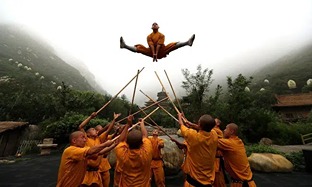
The path to becoming a monk in Bangkok is a highly respected and honorable pursuit. Young men who are interested in becoming monks typically begin their training at a young age, often starting as novices in a temple.
The process of becoming a monk typically involves several stages of training and preparation. Novices typically spend a period of time living in a temple, learning about Buddhist teachings and practices, and assisting the senior monks with various temple duties.
Once a novice has completed their training and demonstrated their commitment to the monastic life, they may choose to take the next step and become a fully ordained monk. This involves a formal ceremony, where the novice will take vows and receive their robes and alms bowl.
Monks in Bangkok are trained in a variety of subjects, including Buddhist teachings, meditation, mindfulness, and community service. They are also trained in the traditional arts, such as calligraphy and music, which are important aspects of Thai culture and heritage.
The training and education of monks is typically overseen by senior monks, who are highly respected for their wisdom and experience. Monks are also encouraged to continue their education throughout their lives, attending workshops and retreats to deepen their understanding of Buddhist teachings and practices.
In addition to their formal training, monks also learn through daily practice and observation. They are encouraged to be mindful and attentive to their thoughts, words, and actions, and to practice compassion and empathy towards others.
Becoming a monk in Bangkok is a rigorous and challenging process, requiring dedication, discipline, and a deep commitment to the principles of Buddhism. However, for those who choose to follow this path, it can be a deeply rewarding and fulfilling way of life, offering the opportunity to cultivate inner peace, wisdom, and compassion, and to serve others in the community.
The Importance of Meditation in Monastic Life

Meditation is a central part of monastic life in Bangkok and is considered a key practice for achieving spiritual enlightenment. Meditation is a way of training the mind to focus and become more aware of the present moment, helping to develop clarity, concentration, and inner peace.
Monks in Bangkok typically engage in a variety of meditation practices, including seated meditation, walking meditation, and chanting meditation. These practices are designed to help develop mindfulness and concentration, as well as to cultivate compassion and empathy towards others.
Seated meditation involves sitting in a cross-legged position, with the hands resting on the knees, and focusing the attention on the breath or a specific object of meditation. This practice is designed to develop concentration and awareness of the present moment, and to help calm the mind and reduce mental chatter.
Walking meditation involves walking slowly and mindfully, paying attention to the sensations of the feet and the movement of the body. This practice is designed to develop mindfulness and awareness of the body and the surrounding environment, as well as to help calm the mind and reduce stress and anxiety.
Chanting meditation involves reciting Buddhist mantras or verses, often in a group setting. This practice is designed to cultivate a sense of community and connection, as well as to develop concentration and mindfulness through the repetition of sacred words and phrases.
Meditation is an essential part of monastic life in Bangkok, helping monks to develop greater clarity, wisdom, and compassion, and to deepen their understanding of the principles of Buddhism. Through regular practice, monks are able to cultivate inner peace and tranquility, and to offer guidance and support to others on their spiritual journeys.
Buddhist Teachings and Beliefs Practiced by Bangkok’s Monks
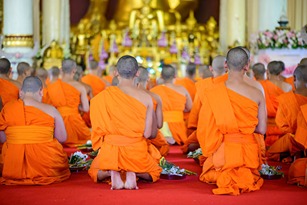
Buddhist teachings and beliefs are at the core of monastic life in Bangkok. Monks are dedicated to studying and practicing the teachings of the Buddha, which are designed to help individuals achieve spiritual enlightenment and liberation from suffering.
One of the key teachings of Buddhism is the Four Noble Truths. These teachings outline the nature of suffering, the causes of suffering, the cessation of suffering, and the path to the cessation of suffering. Monks in Bangkok study these teachings and seek to apply them in their daily lives, helping to cultivate inner peace and wisdom.
Another important teaching of Buddhism is the concept of impermanence. This teaching emphasizes the transient nature of all phenomena, highlighting the importance of living in the present moment and cultivating an attitude of non-attachment. Monks in Bangkok practice meditation and mindfulness to help develop awareness of impermanence, and to cultivate a sense of acceptance and equanimity.
Compassion and loving-kindness are also central to Buddhist teachings. Monks in Bangkok are taught to cultivate these qualities through daily practice and observation, offering support and guidance to others in the community, and working towards the well-being of all beings.
In addition to these core teachings, monks in Bangkok also practice a variety of rituals and ceremonies, including daily chanting and meditation, and special ceremonies to mark important occasions such as births, weddings, and funerals. These practices help to reinforce the importance of Buddhist teachings and beliefs, and to foster a sense of community and connection among monks and laypeople alike.
Overall, the teachings and beliefs of Buddhism are a central part of monastic life in Bangkok. Monks are dedicated to studying and practicing these teachings, seeking to cultivate inner peace, wisdom, and compassion, and to offer guidance and support to others on their spiritual journeys.
Monastic Ethics: Rules and Guidelines for Monks

Monastic ethics play an important role in the lives of Buddhist monks in Bangkok. These rules and guidelines are designed to help monks live a life of simplicity, humility, and compassion, and to cultivate inner peace and wisdom.
One of the key ethical guidelines for monks is the principle of non-harming. Monks are required to refrain from any action that causes harm to themselves or others, including physical harm, verbal harm, and mental harm. This principle reflects the importance of compassion and non-violence in Buddhist teachings, and encourages monks to cultivate kindness and empathy towards all beings.
Another important ethical guideline for monks is the principle of renunciation. Monks are required to live a simple and austere life, renouncing material possessions and worldly pleasures in order to focus on their spiritual practice. This principle reflects the importance of detachment and non-attachment in Buddhist teachings, and encourages monks to develop a sense of inner peace and contentment through simplicity and humility.
Monks in Bangkok are also required to follow a set of precepts, which are guidelines for ethical behavior. These precepts include refraining from killing, stealing, lying, sexual misconduct, and taking intoxicants. Following these precepts helps to cultivate a sense of discipline and mindfulness, and to create a community of individuals dedicated to living a life of moral and ethical integrity.
In addition to these guidelines, monks in Bangkok are also required to follow a strict daily routine, which includes daily meditation, chanting, and other spiritual practices. This routine helps to cultivate a sense of discipline and focus, and to create a strong foundation for spiritual growth and development.
Overall, monastic ethics play an important role in the lives of Buddhist monks in Bangkok. These guidelines help to cultivate inner peace, wisdom, and compassion, and to create a community of individuals dedicated to living a life of simplicity, humility, and ethical integrity.
The Role of Donations in Supporting Monastic Life
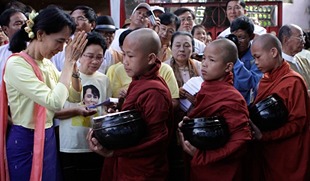
Donations play a crucial role in supporting monastic life in Bangkok. Monks are not allowed to engage in any kind of paid work or business activity, and must rely on the generosity of others for their basic needs. This tradition of offering donations to monks is deeply rooted in Buddhist culture, and reflects the importance of generosity and kindness in the teachings of the Buddha.
There are many ways in which people can offer support to monks in Bangkok. One common practice is to offer food to monks, which is done through the practice of alms-giving. Alms-giving involves offering food and other basic necessities to monks in order to support their basic needs and to honor their spiritual practice. This practice is seen as a way to accumulate merit, or positive karma, and to cultivate generosity and compassion.
In addition to food, people can also offer financial support to monasteries and individual monks. This support can help to cover basic living expenses such as housing, clothing, and medical care, as well as to support the ongoing work of the monastery and its community outreach programs.
It is important to note that donations should be given freely and without expectation of anything in return. The act of giving is seen as an expression of generosity and compassion, and should be done with a pure heart and sincere intentions.
For monks, the practice of receiving donations is also an important part of their spiritual practice. Monks are taught to cultivate gratitude and humility in the face of generosity, and to see the act of receiving as an opportunity to practice mindfulness and awareness.
Overall, the role of donations in supporting monastic life in Bangkok is crucial. This tradition reflects the importance of generosity and compassion in Buddhist teachings, and helps to support the ongoing work of monasteries and individual monks in their pursuit of spiritual growth and enlightenment.
Monks and the Community: Outreach and Service

Buddhist monks in Bangkok are not only dedicated to their spiritual practice, but they are also deeply involved in serving their communities. One of the key teachings of Buddhism is the importance of compassion and kindness towards all beings, and this principle is reflected in the work that monks do to serve their communities.
One way in which monks serve their communities is through outreach programs. Monks often participate in programs that provide education, health care, and other services to disadvantaged communities. These programs are designed to help people in need, and to promote the values of compassion and kindness in the community.
In addition to outreach programs, monks also provide spiritual guidance and support to members of their communities. This can take the form of counseling, meditation instruction, and other forms of spiritual guidance. Monks also play an important role in conducting ceremonies and rituals for the community, such as weddings, funerals, and other important life events.
Another way in which monks serve their communities is through their example. Monks are seen as role models of ethical and spiritual behavior, and their presence in the community can inspire others to live a more compassionate and mindful life. By embodying the teachings of the Buddha, monks can serve as a source of inspiration and guidance for those around them.
Overall, the work that monks do to serve their communities is an important part of their practice. By promoting the values of compassion and kindness, and by providing practical and spiritual support to those in need, monks play a crucial role in creating a more harmonious and compassionate society.
Challenges and Opportunities Facing Bangkok’s Monks

While the role of Buddhist monks in Thai society remains important and highly respected, there are a number of challenges and opportunities that are facing Bangkok’s monks today.
One challenge is the changing nature of Thai society. As the country becomes more modern and urbanized, younger generations are becoming less interested in traditional spiritual practices, including monastic life. This has led to a decline in the number of young people entering monastic life, which could have long-term implications for the future of Buddhism in Thailand.
Another challenge facing Bangkok’s monks is the increasing commercialization of the monastic tradition. Some monks have been criticized for engaging in commercial activities, such as selling amulets or other religious items. This has led to concerns about the integrity of the monastic tradition and its adherence to the principles of simplicity and non-attachment.
On the other hand, there are also opportunities for Bangkok’s monks to adapt and evolve in response to these challenges. One opportunity is to find new ways to engage younger generations and to promote the relevance of Buddhist teachings in modern society. This could involve using social media and other digital platforms to reach out to younger audiences, or developing new programs and initiatives that speak to the needs and concerns of younger people.
Another opportunity is to focus on promoting ethical and sustainable practices within the monastic community. By setting an example of ethical behavior and responsible stewardship of resources, monks can help to promote a more sustainable and harmonious society.
In conclusion, while there are certainly challenges facing Bangkok’s monks today, there are also opportunities for growth and adaptation. By remaining committed to their spiritual practice and to the principles of compassion and kindness, monks can continue to serve as an important source of inspiration and guidance for Thai society in the years to come.
If you’re interested in learning more about Bangkok beyond the lives and practices of Buddhist monks, be sure to check out these related articles:
- “Discovering Bangkok: The Ultimate Travel Guide for First-Time Visitors“Whether you’re a first-time visitor or a seasoned traveler, this comprehensive guide has everything you need to know to make the most of your trip to Bangkok.
- “Understanding the Current State of Crime in Bangkok“While Bangkok is generally a safe city, it’s always good to be informed about the current state of crime and safety issues before you go. This article provides an overview of crime in Bangkok and offers tips for staying safe.
- “Exploring the Colorful World of Bangkok’s Floating Markets“No visit to Bangkok is complete without a trip to one of its famous floating markets. This article takes you on a virtual tour of some of Bangkok’s most vibrant and colorful markets, where you can shop for souvenirs, try local foods, and experience the city’s unique culture.
I hope you find these resources helpful as you explore all that Bangkok has to offer!
Q. What is the lifestyle of Buddhist monks like?
Buddhist monks typically live a simple and disciplined lifestyle, focused on meditation, study, and service to their community. They follow a strict set of rules and renounce material possessions and worldly desires.
Q. What are some practices followed by Buddhist monks?
Buddhist monks practice meditation, mindfulness, and self-discipline as a means of achieving inner peace and enlightenment. They also follow a strict set of rules and renounce material possessions and worldly desires.
